1,071 news posts
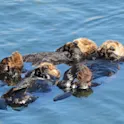
Environment
22 Mar 2023
Unusual Toxoplasma parasite strain killed sea otters and could threaten other marine life
by Angharad Brewer Gillham, Frontiers science writer Image by Mr Laird Henkel, California Department of Fish and Wildlife Four sea otters that stranded in California were found to have died of an unusually severe form of toxoplasmosis, a disease caused by the microscopic parasite Toxoplasma gondii. Scientists warn that this new strain, never previously reported in aquatic animals, could potentially pose a health threat to other marine wildlife and humans. Scientists in California are raising the alarm about a newly reported form of toxoplasmosis that kills sea otters and could also infect other animals and people. Although toxoplasmosis is common in sea otters and can sometimes be fatal, this unusual strain appears to be capable of rapidly killing healthy adult otters. This rare strain of Toxoplasma hasn’t been detected on the California coast before, and may be a recent arrival, but scientists are concerned that if it contaminates the marine food chain it could potentially pose a public health risk. “I have studied Toxoplasma infections in sea otters for 25 years — I have never seen such severe lesions or high parasite numbers,” said Dr Melissa Miller of the California Department of Fish and Wildlife, corresponding author of the study […]
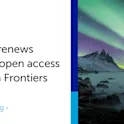
Frontiers news
21 Mar 2023
Norway renews national deal with Frontiers
Frontiers announces that its national agreement with Norway, first signed in 2020, has been renewed for 2023. The agreement, signed by the Norwegian Agency for Shared Services in Education and Research (Sikt), simplifies the publishing process for Norwegian researchers who publish in Frontiers’ journals. Ronald Buitenhus, head of institutional partnerships at Frontiers, said: “Frontiers is delighted to continue to support Norway in the transition to open science through the renewal of this agreement. We look forward to continuing our work together to empower research communities and accelerate the impact of science in society.” Currently 36 institutions and research centers benefit from the terms of the agreement. New institutions can register to participate at any time and there is no annual fee to join. What are the benefits of joining the partnership? Frontiers streamlines the publishing process for researchers and their institutions with tailored, flexible, and financially sustainable models. It offers a proprietary workflow and dashboard that provide new insights, transparency, and confidence. New members will benefit from: national discount on article processing chargers (APCs) centralized, flexible invoicing payment options a dedicated account manager supporting library staff. For more information about participating in the agreement email institutions@frontiersin.org Current participants include: Akershus University […]
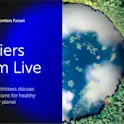
Featured news
20 Mar 2023
Climate crisis calls world’s top scientists to Montreux
~ Experts gather in Montreux to chart a course toward sustainable future ~ World-renowned scientists and thought leaders will gather next month at the Frontiers Forum Live in Montreux, Switzerland, to address critical issues including the climate crisis, improving global health and well-being, and preserving biodiversity. In the first in-person Frontiers Forum event since the onset of the COVID-19 pandemic in 2019, Frontiers has announced an exceptional line up of speakers, renowned researchers, and influencers. Photo credit: Frontiers The Frontiers Forum will take place at the Fairmount Palace in Montreux, Switzerland, from April 27 to April 29. It is expected to attract around 500 distinguished experts in person and around an additional 10,000 guests virtually. The sessions will offer unique insights and opportunities for collaboration among some of the world’s brightest minds, which will then be made available to members of the public via YouTube, providing an invaluable opportunity to learn and engage with cutting-edge research and ideas. “We are bringing the Frontiers community together once again, in person and virtually, to discuss and explore new approaches to the world’s most pressing challenges,” said Dr Kamila Markram, CEO and co-founder of Frontiers. “By connecting global communities across science, policy, and […]

Engineering
17 Mar 2023
Four articles you need to check out on the future of energy research
By Colm Gorey, Frontiers science communications manager Image: Shutterstock.com From drones to using ‘poison nut’ as biofuel, the world of energy research is undergoing immense change. Now, Frontiers highlights some of the energy research articles we have published recently. As the world attempts to deal with the huge impact the climate crisis is having on our planet, scientists are devoting great efforts to developing cutting-edge energy research. While renewables such as wind, solar, and wave dominate the conversations among environmental groups and governments, new technologies in the field of nuclear energy have the potential to be true game changers. Last year, researchers in the US paved the way for abundant, cheap, and clean nuclear fusion energy after achieving the milestone of releasing more energy than was put into a reactor. However, this is but one small area of focus in an otherwise fascinating field of science. Now, Frontiers highlights four recent article published as part of the research topic ‘Horizons in Energy Research’ that could help contribute to many similar breakthroughs in the years to come. Comprehensive Review on Electric Propulsion System of Uncrewed Aerial Vehicles Drones have come a long way since their early days as a luxury gadget […]
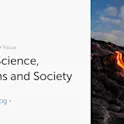
Frontiers news
16 Mar 2023
Partner Focus – Earth Science, Systems and Society
Frontiers is working with a growing number of publishing and institutional partners, and we place great importance on our relationships with all these organizations. Frontiers Partner Focus is a new series of profiles spotlighting some of these partners to showcase their work and demonstrate how their partnership with Frontiers supports it. Credit: Frontiers Our first Partner Focus looks at our publishing partner the Geological Society of London and their journal Earth Science, Systems and Society, which puts sustainability and inclusion at the forefront of Earth science. Connecting science and society The Geological Society of London is the oldest geological society in the world. Founded in 1807, it is the United Kingdom’s (UK) national society for geoscience and is supported by over 12,000 members worldwide. The Geological Society’s mission is to support Earth scientists, grow interest in the natural world, and connect science, the profession and society. Core values of sustainability, inclusion, and diversity are reflected in the Society’s journal Earth Science, Systems and Society (ES3). The journal’s scope focuses on the intersection of the Earth sciences and the social sciences, publishing work which showcases how earth scientists can help solve the challenges facing modern society. A not-for-profit, fully open access […]

Featured news
16 Mar 2023
Common meat-free proteins may trigger soybean and peanut allergies in some people
by Angharad Brewer Gillham, Frontiers science writer Image/Shutterstock.com Meat-free proteins based on legumes are increasingly common. But so are allergies to soy and peanuts, which are also legumes. To find out if it’s safe for patients with these allergies to eat legume-based alternative proteins, scientists investigated how frequent cross-reactions are among people with different legume allergies. They found that although people often produce antibodies against multiple legumes, they rarely have a clinically relevant reaction. Soybean and peanut allergy patients are usually not allergic to other legumes. Many people keen to reduce their meat consumption are turning to substitutes made of legumes packed with protein, vitamins, and fiber. But allergies to legumes like soy or peanuts are both common and dangerous. Are patients allergic to particular legumes at risk from meat-free proteins made of legumes even if they contain different legumes? Dr Mark Smits and a team of scientists at University Medical Center Utrecht set out to investigate. “Both protein consumption and the world’s population are increasing which leads to an urgent demand for sustainable protein sources,” said Dr Thuy-My Le, senior author of the study published in Frontiers in Allergy. “An increase in the consumption of legumes may increase the […]

Environment
15 Mar 2023
What does flattery do to our brains? Here are five Frontiers articles you won’t want to miss
By Deborah Pirchner, Frontiers science writer Image: Shutterstock.com At Frontiers, we bring some of the world’s best research to a global audience. But with tens of thousands of articles published each year, it’s impossible to cover all of them. Here are just five amazing papers you may have missed. What praise and flattery does to our brains Both sincere praise and flattery are rewarding in different ways, but the various effects of these types of praise are not obvious. Now, researchers from Japan have published an article in Frontiers in Human Neuroscience in which they examined the brain activity of participants who received sincere praise or flattery after performing a visual search task. Using neuroimaging, the researchers found different effects of praise. The activation of the part of the brain modulating reward and pleasure processing was higher when participants received sincere praise than when they received flattery. The scientists also observed a socio-emotional effect, based on the positive feedback conveyed by praise. Altogether, they found that the neural dynamics of the rewarding and socio-emotional effects of different types of praise differ. Article link:https://www.frontiersin.org/articles/10.3389/fnhum.2023.985047/full Fish bone matrix may help heal bone defects Biocompatibility and osteogenic activity are properties of decalcified bone […]
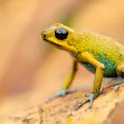
Environment
15 Mar 2023
Rapid surge in highly contagious killer fungus poses new threat to amphibians across Africa
By Mischa Dijkstra, Frontiers science writer Researchers studied the prevalence of the fungus Batrachochytrium dendrobatidis (Bd) in a total of 16,900 historical and recent museum specimens, wild-living individuals, and literature records of amphibians from Africa. Bd causes chytridiomycosis, a contagious and lethal disease of amphibians that has driven hundreds of species worldwide to extinction. Only amphibian species in Africa had so far escaped chytridiomycosis epizootics, but the present study shows that this reprieve is now likely over. Mass fungus infections that drive populations worldwide to near-collapse don’t just occur in science fiction. Chytridiomycosis, the worst vertebrate disease in recorded history, has already wiped out hundreds of species of amphibians around the world. Due to a large part to this fungal disease, 41% of amphibians are currently threatened with extinction. Only species living in Africa seemed to have been relatively spared from the scourge of chytridiomycosis – at least so far. Now, a study in Frontiers in Conservation Science has shown that this reprieve was likely temporary: the results show that the fungus Batrachochytrium dendrobatidis (Bd), the pathogen that causes chytridiomycosis, is by now firmly established throughout Africa. It may so far have been overlooked there, but it is likely that […]

Frontiers news
14 Mar 2023
Dr Marie Soulière engages in AI debate
Frontiers’ senior publishing manager Dr Marie Soulière is participating in two debates on the implications of Artificial Intelligence (AI) in scholarly publishing. The use of AI in scholarly publishing extends beyond production and review processes, as the launch of ChatGPT recently demonstrated. AI can be used to write academic papers with significant implications for research integrity. Marie Soulière, senior publishing manager at Frontiers, was heavily involved in developing Frontiers’ artificial intelligence review assistant (AIRA) and is participating in two debates on the boundaries of AI. “This is a very timely discussion on the ethical implications of AI in publishing”, says Marie Soulière. “We welcome everyone to participate in the debate and contribute to future guidelines on the use of AI.” Webinar on risk versus potential In the webinar “AI in Scholarly Publishing—Risk Versus Potential”, organized by the Society for Scholarly Publishing (SSP), the discussion will focus on authorship by AI. The debate will investigate both the potential and the concern of AI for scientific research and its ethical boundaries. Marie Soulière will be a speaker at this event, on 15 March 2023. Register here. COPE Forum The Committee on Publication Ethics is a non-profit organization committed to educating and supporting […]
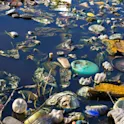
Featured news
14 Mar 2023
Machine learning helps researchers separate compostable from conventional plastic waste with ‘very high’ accuracy
By Deborah Pirchner, Frontiers science writer Image: Shutterstock.com Compostable plastics are on the rise. Despite their merits, these products, including wrappers and packaging, can contaminate conventional plastic waste in the recycling process. Now, scientists used highly sensitive imaging techniques and developed machine learning methods that can identify compostable plastics among conventional types. Disposable plastics are everywhere: Food containers, coffee cups, plastic bags. Some of these plastics, called compostable plastics, can be engineered to biodegrade under controlled conditions. However, they often look identical to conventional plastics, get recycled incorrectly and, as a result, contaminate plastic waste streams and reduce recycling efficiency. Similarly, recyclable plastics are often mistaken for compostable ones, resulting in polluted compost. Researchers at University College London (UCL) have published a paper in Frontiers in Sustainability in which they used machine learning to automatically sort different types of compostable and biodegradable plastics and differentiate them from conventional plastics. “The accuracy is very high and allows the technique to be feasibly used in industrial recycling and composting facilities in the future,” said Prof Mark Miodownik, corresponding author of the study. Up to perfect accuracy The researchers worked with different types of plastics measuring between 50mm by 50mm and 5mm by 5mm. […]

Featured news
13 Mar 2023
Why understanding human evolution on Earth will be absolutely essential for any future deep-space colonies to survive and thrive
By Lee G Irons, Norfolk Institute, and Morgan A Irons, Cornell University Photo of Lee and Morgan, Credit: Lee Irons and Morgan Irons Is human migration into space inevitable? Is it based on facts, or is it based upon a belief in human exceptionalism? These are some of the questions explored by Lee and Morgan Irons in a recent article published in Frontiers in Astronomy and Space Sciences, asking whether humans’ evolutionary connection to Earth requires us to inhabit space the same way we do here. Lee is a physicist, engineer, and the executive director of Norfolk Institute. Morgan is an astro-ecologist and PhD candidate at Cornell University, a Carl Sagan Institute Fellow, a US National Science Foundation Graduate Research Fellow, and a Norfolk Institute Fellow. In this latest guest editorial, they explain why – and why not – space settlement might be possible. How can such a feat be accomplished? Is it just a matter of leveraging the resources of a billionaire and the capital power of the economically developed Earth to ship the materials to Mars to build a city with a dome, followed by pressurizing the dome with an Earth-like atmosphere, and spreading biosolids (ie, sterilized human […]
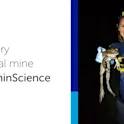
Frontiers news
10 Mar 2023
Anna Savage – The canary in the coal mine
Author: Natasha Inskip Dr Anna Savage is an Associate Professor of Biology at the University of Central Florida. She previously completed her PhD in Ecology and Evolutionary Biology at Cornell University and was a postdoctoral fellow at the Smithsonian Institution. Recently, Anna has taken on the role of Specialty Chief Editor within the Behavior, Evolution, and Ecology section of Frontiers in Amphibian and Reptile Science. The United Nations Sustainable Development Goal 15 Life on Land is about aiming to protect, restore, and promote sustainable use of terrestrial ecosystems, sustainably manage forests, combat desertification, and halt and reverse land degradation and halt biodiversity loss. In this blog, we will explore how Anna’s important work contributes to this goal. Photo credit: Erin Brosnan Could you start by running us through your expertise and your main areas of research interest? “My background is in evolutionary biology and I care a lot about conservation of amphibians. Most of us know that they’re facing massive global declines and it’s been a conservation issue that was first in the news when I was a kid in the 1990s. That was a motivator that drove me to become a scientist from the start. “As I became more […]
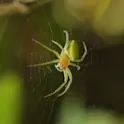
Environment
07 Mar 2023
Wings, not webs: Certain bugs are the winners of urbanization, impacting cities’ insect diversity
By Deborah Pirchner, Frontiers science writer Image: Dr Marion Chatelain. Occurrence and abundance of the ‘cucumber green spider’ decreased along the rural-urban gradient. Urban spread goes hand in hand with wildlife habitat loss and fragmentation. This impacts all animals, down to the smallest. Scientists found that the level of urbanization impacts arthropod abundance, richness, and diversity, factors which likely alter the foraging behavior of bigger animals. Cities are bursting with life, both human and animal. The smallest of them, insects, spiders, and ants are easily overseen, but their presence – or absence – in cities has wide-reaching effects. Scientists in Austria have published a study in Frontiers in Ecology and Evolution, which found a correlation between the presence of arthropods – invertebrate animals with an exoskeleton; among them are bees, insects, and spiders – and level of urbanization. “We show that richness and diversity of arthropods on trees and bushes decreases along the rural-urban gradient,” said first author Dr Marion Chatelain, a postdoctoral researcher at the University of Innsbruck, Austria. “More specifically, we show that urbanization disfavors wingless groups, particularly so on trees. Indeed, web spiders and springtails are less likely to be found in the city, where, on the […]

Frontiers news
06 Mar 2023
UK universities renew national open access deal with Frontiers
Researchers from over 160 UK universities will continue to benefit from a simplified and streamlined route to open access publishing, thanks to the renewal of JISC collections’ partnership with gold open access publisher Frontiers. The initial partnership with JISC, which undertakes negotiations and licensing for digital content agreements on behalf of UK universities, was first agreed in September 2019. It has been a landmark deal for researchers, furthering access to open science in the UK. Under the renewed deal, which runs from 1 January to 31 December 2023, JISC member universities retain control of funding eligibility and benefit from a 10% national discount rate on publication costs. Dedicated account managers ensure a personalized customer experience. Researchers affiliated with participating organizations can access personalized dashboards for engagement monitoring, collaborative peer-review and enhanced dissemination tools. Ronald Buitenhuis, head of institutional partnerships at Frontiers, said: “We are delighted to further our partnership with JISC Collections and support open science in the UK. Solid relationships with UK institutions are essential and we aim to support their librarians and researchers. Frontiers is committed to offering flexible models that fit the needs of our current and future partners.” All submitted articles remain subject to Frontiers’ editorial […]
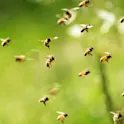
Featured news
06 Mar 2023
Bees follow linear landmarks to find their way home, just like the first pilots
By Mischa Dijkstra, Frontiers science writer Scientists have shown that honeybees retain a memory of the dominant linear landscape elements in their home area like channels, roads, and boundaries. When transported to an unfamiliar area, they seek out local elements of this kind, compare their layout to the memory, and fly along them to seek their way home. This navigation strategy is similar to the one followed by the first human pilots. In the earliest days of human flight, before the invention of the first radio beacons and ground-based electronic systems, and modern GPS, pilots commonly navigated by following roads and railways – striking linear landscape elements at ground level that guide towards a destination of interest. Enter the honeybee. A century of research has shown that honeybees are navigators par excellence. They can navigate by their sense of smell, the sun, the sky’s pattern of polarized light, vertical landmarks that stand out from the panorama, and possibly the Earth’s magnetic field. They are also clever learners, able to recognize associations between disparate memories in order to generalize rules. Now, scientists have shown that honeybees tend to search for their way home by orienting themselves in relation to the dominant […]